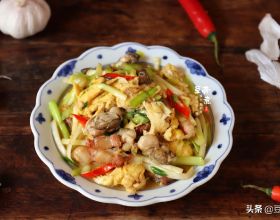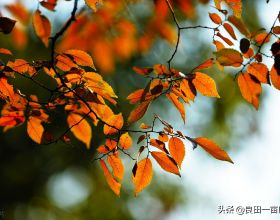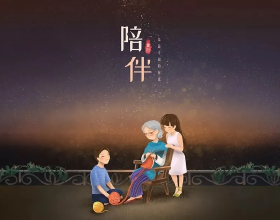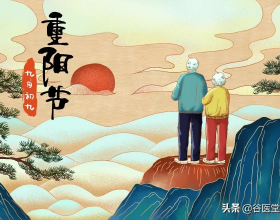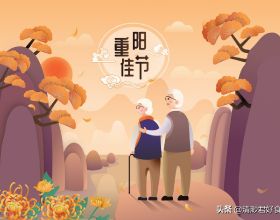重陽節 Double Ninth Festival
“九九”兩陽數相重,故曰“重陽”;因日與月皆逢九,故又稱為“重九”。九九歸真,一元肇始,古人認為九九重陽是吉祥的日子。古時民間在重陽節有登高祈福、秋遊賞菊、佩插茱萸、拜神祭祖及飲宴祈壽等習俗。
重陽節,又稱為“老人節”。重陽節早在戰國時期就已經形成,到了唐代,重陽節已經被證實定為民間的節日,此後重陽節一直沿襲至今。The lunar calendar on September 9, is the traditional double ninth festival, also calls “The Old Person Festival”. The double ninth Festival as early as already formed in the Warring States time, to the Tang dynasty, The double ninth Festival has been decided as officially folk the holiday, hereafter the double ninth festival follows until now.
登高可以驅除黴運,還意指“晉升高位”。這也是古人為什麼很重視這一傳統習俗。登高之所以受人重視,特別受老人重視,是因為人們認為登高還意寓“登頂長壽”。除此之外,人們還相信登山能使人健康長壽。Apart from expelling bad luck and disasters, climbing mounting also indicates “climbing to a higher position”, and it is also an important reason why ancient people pay much attention about this custom. Another reason that climbing mountains are valued by people, especially by the elderly is that is has a meaning of “climb to a longevous life”. Also for this reason people believe that climbing mountains can make people live a more longevous life.
在九月登高既是件愜意放鬆的事,又是件可以欣賞到自然之美的幸事。重陽節登高,在唐代就開始盛行了,古時也有很多跟重陽登高有關的詩歌。It is really refreshing to climb mountains and enjoy the beauty of nature at this bright and clear time in autumn. Climbing mountains on Double Ninth Festival was already prevailing in the Tang Dynasty, and a lot of poems were devoted to this custom.
九九重陽 詩詞賞析
《九月九日憶山東兄弟》 王維
獨在異鄉為異客,
每逢佳節倍思親。
遙知兄弟登高處,
遍插茱萸少一人。
Double Ninth, Missing My Shandong Brothers
Wang Wei
As a lonely stranger in the strange land,
Every holiday the homesickness amplifies.
Knowing that my brothers have reached the peak,
All but one is present at the planting of flowers
《登高》杜甫
風急天高猿嘯哀,渚清沙白鳥飛回。
無邊落木蕭蕭下,不盡長江滾滾來。
萬里悲秋常作客,百年多病獨登臺。
艱難苦恨繁霜鬢,潦倒新停濁酒杯。
Ascend Du fu
In a sharp gale from the wide sky apes are whimpering
Over the clear lake and white sand birds are flying homeward
Immensity of leaves rustling fell
The never-ending Yangtze river rolling on
I have come thousands of miles miles away, sad now with autumn
And with my hundred years of woe, I climb this height alone.
Ill fortune has laid a bitter frost on my temples,
Heart-ache and weariness are a thick dust in my wine.
《醉花蔭》李清照
薄霧濃雲愁永晝,瑞腦銷金獸。
佳節又重陽,玉枕紗櫥,半夜涼初透。
東籬把酒黃昏後,有暗香盈袖。
莫道不銷魂,簾卷西風,人比黃花瘦!
To the Tune of Intoxicated Under the Shadow of Flowers
Li Qingzhao
Light mists and heavy clouds,
melancholy the long dreary day.
In the golden censer
the burning incense is dying away.
It is again time
for the lovely Double-Ninth Festival;
The coolness of midnight
penetrates my screen of sheer silk
and chills my pillow of jade.
After drinking wine at twilight
under the chrysanthemum hedge,
My sleeves are perfumed
by the fragrance of the plants.
Oh, I cannot say it is not endearing,
Only, when the west wind stir the curtain,
I see that I am more gracile
than the yellow flowers.
《採桑子》 毛澤東
人生易老天難老,歲歲重陽。
今又重陽,戰地黃花分外香。
一年一度秋風勁,不似春光。
勝似春光,寥廓江天萬里霜。
To the Tune of Tsai Sang Tzu
Mao Zedong
Man ages all too easily, not Nature:
Year by year the Double Ninth returns.
On this Double Ninth,
The yellow blooms on the battlefield smell sweeter.
Each year the autumn wind blows fierce,
Unlike spring’s splendour,
Yet surpassing spring’s splendour,
See the endless expanse of frosty sky and water.

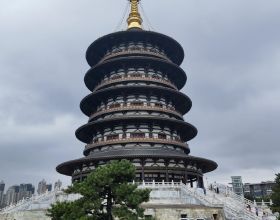
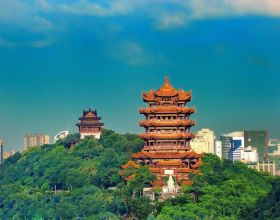
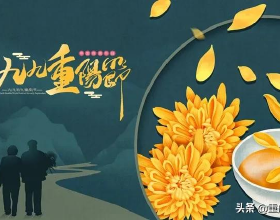
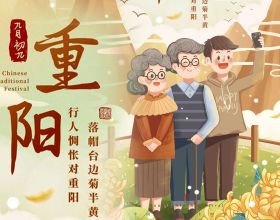
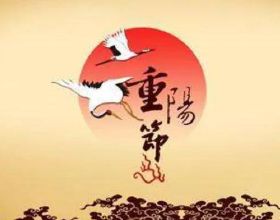
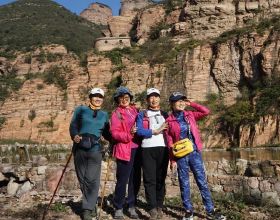

![[重陽節]九九重陽節 [重陽節]九九重陽節](http://i.kkannews.com/thumb/280x220/b/b4/bb4f2cac950cae4cbe355e9569706c94.jpg)
